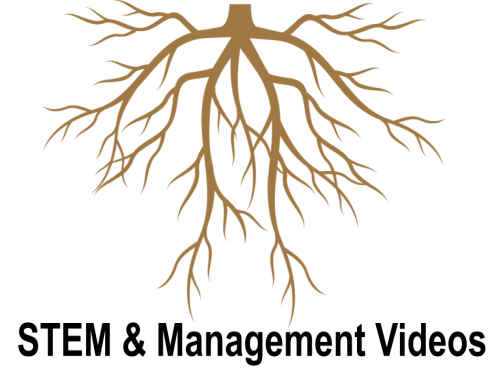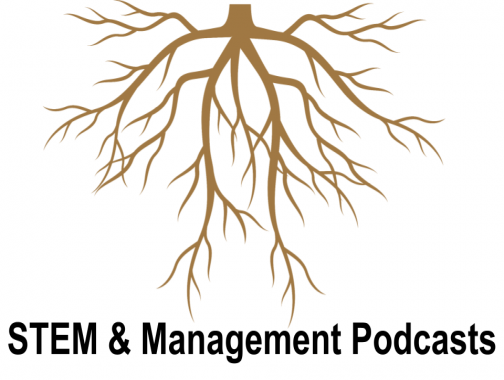The STEM and Management page has been organized into two sections: Pedagogy & Form and Curriculum & Content. Within each section, there are a variety of disciplines referenced, in some cases with a dedicated list of resources for a particular subject area and in some cases organized under a broader umbrella heading. The development of this section is ongoing and not intended as an exhaustive list. If you have resources to share, you are encouraged to submit them and any other suggestions you may have for the resource hub.

STEM: Pedagogy & Form
-
Which Evidence-based Teaching Practices Change over Time? Results from a University-wide STEM Faculty Development Program (2022), written by Mallory A. Jackson et al. in the International Journal of STEM Education, the article traces the development of the Consortium for the Advancement of Undergraduate STEM Education (CAUSE) and explores the best practices for STEM programs at the university level.
-
Four Frames for Systemic Change in STEM Departments (2018) by Daniel L. Reinholz and Naneh Apkarian in the International Journal of STEM Education examines the four-frame model of organizational change in higher education STEM settings. The four frames (structures, symbols, power, and people) are discussed in greater detail in their relationship to departmental culture and the "process and product of change" (p.3).
-
A Model of Peer Effects on Instructor Innovation Adoption (2020) by Melody McConnell et al. in the International Journal of STEM Education looks at how "Academic peer interactions facilitate the exchange of information, ideas, and awareness of teaching innovations [which can] provide encouragement and/or discouragement that can ultimately support or inhibit instructional change" (p.2).
-
Gendered Differences in Academic Emotions and their Implications for Student Success in STEM (2018), by Michael Pelch in the International Journal of STEM Education, explores some practical strategies for addressing issues of anxiety that disproportionally affect women in STEM fields. Related Viewing: Picture a Scientist was created by the Wonder Collaborative in 2020 to explore the discrimination, harassment, and resistance to women in STEM fields.
-
Science is for Everyone: Integrating Equity, Diversity, and Inclusion in Teaching (2022) is a toolkit from Carleton University to "provide ideas to diversify science education to support recruitment, retention, and advancement of all students and bring topics of equity, diversity, and inclusion (EDI) to the curriculum."
-
Case-Based Learning is a resource available on the UDL On Campus hub. Using the Universal Design for Learning Guidelines, this page explores how case studies can be used for teaching and learning in STEM-based fields of study.
Biological Sciences
-
Gender-Inclusive Biology is a resource developed by secondary school teachers looking to "adapt existing biology teaching to grow a gender-inclusive curriculum." Organized around a framework of 5 principles for gender inclusion -- Authenticity, Continuity, Affirmation, Anti-Oppression, and Student Agency -- the material is also relevant to the post-secondary context.
-
Making Biology Learning Relevant to Students: Integrating People, History, and Context into College Biology Teaching (2008) by Katayoun Chamany et al. in Life Sciences Education presents a series of examples based on the premise that the discipline should employ "real-world problems to thread a number of biological concepts together ... to move away from seeing biology as a collection of disparate concepts, subject areas, or chapters from textbooks that are far removed from society" (p.1).
Physical & Environmental Sciences
- "Diversity, Equity, Inclusion, and Respect in Chemistry Education Research and Practice" is a special publication from the Journal of Chemical Education (2022). The contributions for this edition highlight successful examples of DIER (diversity, equity, inclusion, and respect) in "chemistry research and practice... [, serving as] the groundwork for transformative practice... [and] pedagogical reform in the classroom, research, and professional spaces ... (p.1, from the Introduction). Related Viewing: In Intersections of Indigenous Education and Chemistry at First Nations University of Canada, Vincent Ziffle, Assistant Professor from the Department of Indigenous Science, the Environment and Economic Development (DISEED), talks about the intersections of Chemistry and Indigenous ways of knowing.
- Inclusion for Excellence: The Physics Community in Canada (2021) is a publication from Physics in Canada, a magazine published twice a year by the Canadian Association of Physicists. This special issue examines the "larger state of... EDI within the physics community in Canada" (p.1). There are over 25 articles in the magazine, looking at issues of Indigeneity and decolonization, regionality, gender and sexuality, and race and representation and how they impact Physics "as a social field rather than as “pure knowledge” independent from social values and decisions" (Ingo Salzmann et al., p.4).
Computer & Mathematical Sciences
-
Inclusive Teaching Practices -- Higher Ed is a section from the National Center for Women & Information Technology (NCWIT) in the United States. The organization is "focused on advancing innovation by correcting underrepresentation in computing" and examining a number of topics, a few of which are listed here:
Top 10 Ways to Engage Underrepresented Students in Computing
How Do You Retain Women through Collaborative Learning?
Making Interdisciplinary Connections to Engage Students
-
Personal, Expository, Critical, and Creative: Using Writing in Mathematics Courses is a recommended reading coming out of the May 2022 Canadian Mathematics Education Study Group on assessment practices for undergraduate Mathematics students.
-
Learning How to Learn Mathematics was developed by Sa’diyya Hendrickson, a sessional lecturer at the University of Toronto with the Faculty of Engineering, the Mathematics Department, and the International Foundation Program (IFP). She is also the project lead for the online Preparing for University Mathematics Program (ePUMP) at the university. The resource provides perspectives and specific active learning practices that enhance both mathematical proficiency and conceptual understanding.
-
Equity, Diversity, and Inclusivity: Department of Mathematical and Statistical Sciences developed from the University of Alberta as an acknowledgment "that the universality and unity of the language of mathematics and statistics lies in contrast to practices within our discipline that have often placed both barriers to entry and obstacles as to who can contribute and thrive within our community." This resource may serve as a model for developing more inclusive and equitable approaches in Mathematics and Statistical Science departments.
-
The Identity in Computing Lab at Duke University is "dedicated to studying the impact of identity on computing, from classroom/industry environments to the technologies that are developed (and the identities these technologies ultimately impact in adverse ways)." The university offers a Cultural Competencies in Computing fellowship, supporting the work in computer science to "identify strategies for making computing more equitable and inclusive."
-
The Academy of Inquiry-Based Learning (AIBL) is an organization focused on improving teaching and learning in higher education mathematics directed by Stan Yoshinobu, Assistant Professor, Teaching Stream, in the Department of Mathematics at the University of Toronto. AIBL has an extensive resource section explaining the philosophy behind AIBL and explanations of their methodology, including a detailed Equity and Inclusion section.
STEM: Curriculum & Content
-
The Canadian Black Scientists Network, co-founded by University of Toronto Professor of Biological Sciences and Canada Research Chair, Maydianne Andrade, “...exists to Elevate, Make Visible, Celebrate and Connect Black Canadians pursuing or possessing advanced degrees in STEMM [Science, Technology, Engineering, Mathematics & Medicine/Health.]" In April 2022, the inaugural BE-STEMM -- Black Excellence in STEMM -- conference explored Black excellence in the Sciences. Related Reading: Check out the 2022 BE-STEMM keynote speaker biographies and the STEM-related resources, posted in the fifth accordion on the Black Knowledges and Resources page.
-
IndigeSTEAM is an Indigenous-led organization in Calgary, Alberta whose "mission is the provision of Indigenous-led and culturally-relevant programming in STEM/STEAM to support a better future for Indigenous youth [through] spaces that are ethical and respect Indigenous culture and Ways of Knowing." For IndigeSTEAM, the "A" in the acronym "can reflect Arts, Architecture and Agriculture – all areas that Indigenous peoples have been innovators in for thousands of years."
-
Resources is a collection of guides for instructor resources developed by the Carl Wieman Science Education Initiative (CWSEI) at the University of British Columbia. Carl Wieman is a Professor of Physics and Professor in the Graduate School of Education at Stanford University. Related Viewing: "How to Improve the Teaching of Science in Higher Education" is one of seven conversations the Centre for Teaching and Learning at the University of Windsor had with Carl Wieman. Related Viewing: "Basic Instructor Habits to Keep Students Engaged" by Carl Wieman.
-
Teaching by your Discipline is a portal to resources developed by SERC (Science Education Resource Centre) at Carleton College in Northfield Minnesota:
1. Mathematics
2. Sustainability & Climate Change
3. Geoscience
4. Physics
5. Computer Science
6. Economics
7. Biology [content not posted]
8. Chemistry
-
Disability in SETAC: We Can Do Better (2020) by Ezra Miller, member of the Inclusive Diversity Committee for the Society of Environmental Toxicology and Chemistry (SETAC). In this personal narrative, he reflects on his experiences with his disabilities (ADHD and anxiety disorder) as a scientist to “help challenge the negative perceptions of people with disabilities in STEM fields.”
-
"Creating Inclusive Classrooms by Engaging STEM Faculty in Culturally Responsive Teaching Workshops" (2020) by Sanders O'Leary et al. in The International Journal of Stem Education explores how particular approaches to pedagogy -- including the exploration of student and instructor identities and discussing barriers to learning relating to “implicit bias, microaggressions, stereotype threat, and fixed mindset” -- can develop more inclusive learning environments and benefit students in their learning (p.1). The definitions of these words are available in the terminology section of the resource hub. Related Reading: Culturally Responsive Teaching (CRT) is one of the conceptual frameworks used by the Teaching and Learning Support Services (TLSS) at the University of Ottawa, taking into consideration the context of the student and how this relates to the content of the courses they take.
-
Race and Gender Differences in how Sense [sic] of Belonging Influences Decisions to Major in STEM (2018) by Katherine Rainey et al. concludes that the "structural and cultural features" of universities need to shift (p.1). The article examines how STEM disciplines often "work to support those in the privileged group while often discouraging those from marginalized groups" (p. 13) and four factors which are key to creating a sense of belonging for women in STEM fields:
1. Interpersonal relationships
2. Science identity
3. Personal interest
4. Competence
-
LGBTQ+ Experiences in STEM (2020) by Ezra Miller, member of the Inclusive Diversity Committee for the Society of Environmental Toxicology and Chemistry (SETAC). In this essay, Miller explores a number of challenges confronting LGBTQ+ communities in STEM and possible solutions for making the environments more equitable and inclusive.
-
Research mentoring and scientist identity: insights from undergraduates and their mentors (2018), written by Rachael D. Robnett et. al. explores three models of mentoring and how they influence “the degree to which undergraduates psychologically identify with science" (p.2). The three models are categorized as instrumental, socioemotional, and negative. The sample "was predominantly composed of women, first-generation college students, and members of ethnic groups that are historically underrepresented in science" (p.1).
Biological Sciences
-
Project Biodiversify is a secondary school resource, with material relevant to teaching undergraduate Biology courses. It is described as an "online space that promotes the humanization, diversification, and inclusivity of biology classrooms."
-
Striving for Inclusion in Academic Biology was a 2022 webinar led by Dr. Angela Byars-Harrison from the department of Internal Medicine at the University of Wisconsin-Madison. The webinar discussed the importance of culturally responsive mentorship as part of the Society for the Advancement of Biology Education Research's (SABER) efforts to be more "culturally responsive to the differing social identities... especially related to racial and ethnic identity."
Computer & Mathematical Sciences
-
MOSAIC (Mathematics Outreach Society Accessibility and Inclusiveness Column) was developed by the Canadian Mathematical Society's Equity, Diversity, and Inclusivity Committee. This publication is an extension of their official newsletter, CMS Notes.
-
inclusion/exclusion is a blog developed by The American Mathematical Society that aims to "discuss issues pertaining to marginalized and underrepresented groups in mathematics [to]... develop a more inclusive, supportive, and diverse community." There are over twenty topics listed, dating back to the blog's inception in February 2017.
-
When Twice as Good Isn’t Good Enough: The Case of Cultural Competence in Computing (2020), by Alicia Nicki Washington, Professor of Computer Science at Duke University. In her presentation at the 2020 Special Interest Group Computer Science Education (SIGCSE) conference, she explored the equity, diversity and inclusion challenges in the computer workforce and how they are often rooted in undergraduate computing departments (p.213). Washington contends that university computing departments need to develop their cultural competence in EDI to begin addressing issues of demographic representation in the field. Related Reading: Intercultural Teaching Competence from the Centre for Teaching and Learning at Western University.
Psychology
-
The Pandemic as a Portal: Reimagining Psychological Science as Truly Open and Inclusive (2022), by Alison Ledgerwood et al. in Perspectives on Psychological Science offers a concise critique of a "scientific culture [which] restricts the diversity of identities and perspectives held by people who enter the field... [and] undervalues all participant perspectives outside of those reflecting a narrow slice of the human population" (p.938). The article proposes a 4-step process for "reimagining" the discipline's culture, system, and policies (p. 946).
-
What If Psychology Took Intersectionality Seriously? Changing How Psychologists Think About Participants (2019) by Kaitlin McCormick-Huhn et al. in Psychology of Women Quarterly explores four intersectional perspective shifts for seeing the individual in the field of Psychology by acknowledging that: individuals are multidimensional, social group memberships are dynamic and changing, structural power is a feature of intersectional positions, and these positions are influenced and shaped by systemic disadvantage and advantage (pp. 5-6).
-
Decolonizing Development: A Decolonial Approach to the Psychology of Economic Inequality (2018) in Translating Issues in Psychological Science by Sara Estrada-Villalta & Glenn Adams examines how approaches to economic development, poverty reduction, and international development are often rooted in colonial models which emphasize a "societal development as a universal linear trajectory" (p.200). This decolonial approach of Estrada-Villalata & Adams challenges "the commonly valorized individualistic models of the self that inform research and practice [that] are products of a violent colonial past as well as manifestations of present coloniality" (p.205).
-
"Racial Inequality in Psychological Research: Trends of the Past and Recommendations for the Future" (2020) by Steven O. Roberts et al. in Perspectives on Psychological Science
-
"Toward a Psychology of Homo Sapiens: Making Psychological Science more Representative of the Human Population" (2018) by Rad et al. from the Proceedings of the National Academy of Sciences (PNAS)
Management: Pedagogy & Form
-
Infusing Activities Centered Around Diversity, Equity, and Inclusion into Statistics Courses was developed by the Consortium for the Advancement of Undergraduate Statistics Education (CAUSE) to address issues of equity, diversity, and inclusion in Methods and Statistics courses. Related Reading: CAUSE developed an extensive pedagogic modules section for teachers of statistics.
-
The Institute for Gender and the Economy (GATE) at the Rotman School of Management "promotes an understanding of gender inequalities and how they can be remedied – by people of all genders – in the world of business and, more broadly, in the economy." An extensive Education section is available, broken into the following sections:
4. Explainers (exploring topics and resources pertinent to gender and the economy)
6. Case Studies
Management: Curriculum & Content
-
Case Studies with diverse personas were developed by UTSC Academic Librarian Mariana Jardim from The BRIDGE. This Zotero site contains a series of business case studies examining the social and decision-making dynamics of underrepresented or marginalized groups in the business community.
-
The Collections Showcase was developed by The BRIDGE -- a partnership between the Department of Management and the UTSC Library -- and features a variety of reading and resource lists exploring the connections between Equity, Diversity and Inclusion and the world of business and finance.
Accounting
The American Accounting Association developed a diversity, equity, inclusion, and belonging (DEIB) page to showcase resources in the following areas:
-
Asian American and Pacific Islander Heritage Month
-
National Hispanic Heritage Month
-
LGBTQIAP+ Pride Month
-
Persons with Disabilities Awareness Month
-
National Native American Heritage Month
-
Black History Month
Economics
-
Diversity, Equity, and Inclusion in the Economics Classroom is an article written by Art Carden, Senior Fellow at the American Institute for Economic Research. Carden explores how Diversity, Equity, and Inclusion (DEI) can be incorporated into the classes he teaches as an Associate Professor of Economics at Samford University in Birmingham, Alabama.
-
Best Practices for Economists: Building a More Diverse, Inclusive, and Productive Profession was developed by the American Economic Association. The resource page lists best practices for economists in four areas of professional conduct:
1. Conducting Research
2. Serving as Colleagues
3. Working with Students
4. Leading Departments and Workplaces
Organizational Behaviour
"Rethinking the Course Syllabus: Considerations for Promoting Equity, Diversity, and Inclusion" (2020) by Milton A. Fuentes in Teaching of Psychology discusses the importance of infusing EDI in the syllabi of courses taught in psychology to promote inclusive learning and culturally competent learning environments.
Equity, Diversity, and Inclusion Framework is a set of guiding principles developed by the American Psychological Association (APA) to address the basic assumptions that are associated with the best practices in organizational EDI work in the field of psychology. According to the Vision Statement, the "APA strives for an accessible, equitable, and inclusive psychology that promotes human rights, fairness, and dignity for all."

